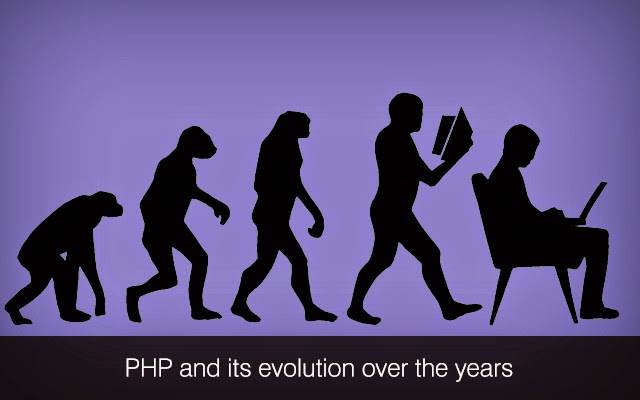PHP and Its Evolution over the Years
 As a dynamic programming language, PHP can be used for both general programming and server-side scripting context. But PHP was originally not written by Rasmus Lerdorf as a new programming language. After designing the language to maintain his personal home page, Lerdorf subsequently extended it build simple and dynamic web pages. He publicly released "Personal Home Page/Forms Interpreter" or PHP/FI as "Personal Home Page Tools (PHP Tools) version 1.0". Since its first public release in April, 1996, PHP has been evolving over the years as a powerful and dynamic programming language.
As a dynamic programming language, PHP can be used for both general programming and server-side scripting context. But PHP was originally not written by Rasmus Lerdorf as a new programming language. After designing the language to maintain his personal home page, Lerdorf subsequently extended it build simple and dynamic web pages. He publicly released "Personal Home Page/Forms Interpreter" or PHP/FI as "Personal Home Page Tools (PHP Tools) version 1.0". Since its first public release in April, 1996, PHP has been evolving over the years as a powerful and dynamic programming language.
Continuous Evolution of PHP as a Dynamic Programming Language
PHP/FI: It is the second-generation implementation of the programming language that provided a complete makeover to it. The implementation further converted PHP into an independent programming language from a set of tools. Along with supporting cookies and user-defined functions, PHP/FI also came with built-in support for several databases including mSQL, DBM and Postgres95.
PHP 2: The version 2.0 of PHP was released in June 1995. It is also a single and full version of PHP 2.0. When PHP 2.0 was released in November 1997, it came with a completely rewritten underlying parsing engine. The parsing engine also distinguished the commercial release from the earlier beta release.
PHP 3: The version 3.0 of the programming language closely resembles the modern PHP. PHP 3.0 was developed by the combined efforts of many developers across the world. The version was released officially after thorough open public testing. The release also made PHP installed on 10% of web servers across the world. It was further hosted on web servers running on Macintosh and different versions of Windows.
PHP 4.0: PHP 4.0 was designed with the objective to optimize the performance of complex applications. Along with making PHP’s code base more modular, the version 4.0 also supported a wide range of databases and third-party APIs. It was further made based on the new Zend engine. The engine and new features improved the programming language’s performance drastically. PHP 4.0 also supported additional web servers, output buffering, HTTP sessions, while handling user input more securely.
PHP 5.0: After several pre-releases, the version 5.0 of PHP was officially released in July 2004. Along with Zend 2.0, it came with a number of new features and significant improvements. Along with supporting XML, PHP 5.0 further allowed programmers to access and manipulate XML as PHP objects. At the same time, it also came with an improved MySQL extension called MySQLi that included an object oriented interface. It further enable programmers to create make Web Services more interoperable by using the built-in SOAP extension.
PHP 5.1: The version 5.1 of the programming language was released in November 2005 with a completely rewritten date handling code, improved time zone support, several built-in extensions, and bug fixes. By enabling PDO extensions, PHP 5.1 simplified and improved data handling.
PHP 5.2: PHP 5.2.0 was released in November 2006 with features to improve the performance of heavy-traffic websites. Along with more tracking memory usage more accurately and efficiently, the version 5.2.0 also came with a new memory manager for the Zend Engine. It also came with a number of new features including ZIP extension, JSON extension, input filtering, date and time objects, and hooks for tracking the progress of file uploads.
PHP 5.3: The earlier versions of PHP were lacking the better object model required by complex application. So the version 5.3 of PHP was designed with improved object oriented programming. Along with several new extensions and optimal garbage collection for cyclic references, PHP 5.3 also supported namespaces, closures, late static binding and similar concepts related to object oriented programming.
PHP 5.4: As a major version of the programming language, PHP 5.4 was released in March 2012. Along with over 100 bug fixes, it came with new features like shortened array syntax, traits and built-in web server for application testing. At the same time, the version also introduced optimized performance and memory footprint.
PHP 5.5: The version 5.5 of PHP was released in June 2013. It introduced several new features including finally keyword, support for constant array/string dereferencing, simplified password hashing API, generators and coroutines, and support for list() constructs in foreach statements.
According to several reports, a new major version of the programming language called PHP7 is under development. The next version of PHP aims to optimize its performance by refactoring the Zend framework, while retaining its language compatibility. You can hire PHP developers from PHP development company for your web development needs, who can help you build web apps within allocated budgets and time schedules.
We provide custom PHP development services. If you would like to hire developers or would like to discuss with our developers about your projects, please contact us at Mindfire Solutions.
